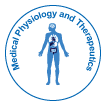Role of Homeostasis in Human Physiology: A Review
Received Date: Apr 03, 2017 / Accepted Date: Apr 06, 2017 / Published Date: Apr 12, 2017
Abstract
Homeostasis plays a major role in the proper functioning of the body. It is regulated by different mechanisms such as osmoregulation, thermoregulation and chemical regulation by different systems in the body like respiratory system, digestive system, nervous system, urinary system. These systems maintain the stability of the body by releasing the stimulus when the hormone levels increases or decreases. The stimulus is generated; the cells act accordingly to maintain the proper functioning of the cell. Thus feedback mechanisms work and maintain the cells to meet the set point. The endocrine system has a regulatory effect on other organ systems in the human body. In the muscular system, hormones adjust muscle metabolism, energy production, and growth. In the nervous system, hormones affect neural metabolism, regulate fluid and ion concentration and help with reproductive hormones that influence brain development.
Keywords: Homeostasis; Diffusion; Osmosis; Pituitary gland; Prolactin; Blood plasma
Citation: Palaparthi S (2017) Role of Homeostasis in Human Physiology: A Review. J Med Physiol Ther 1:101.
Copyright: © 2017 Palaparthi S. This is an open-access article distributed under the terms of the Creative Commons Attribution License, which permits unrestricted use, distribution, and reproduction in any medium, provided the original author and source are credited.
Share This Article
Open Access Journals
Article Usage
- Total views: 88641
- [From(publication date): 0-2017 - Apr 04, 2025]
- Breakdown by view type
- HTML page views: 85023
- PDF downloads: 3618
